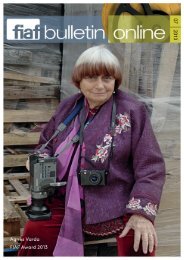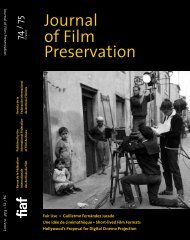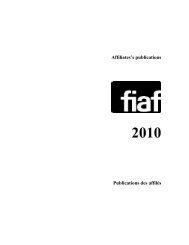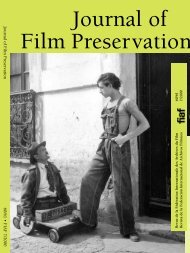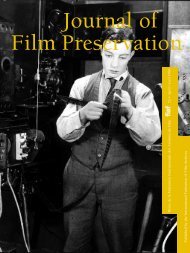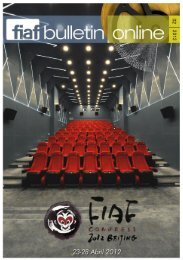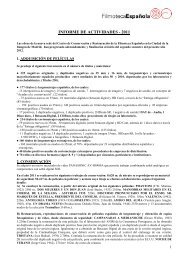Journal of Film Preservation - FIAF
Journal of Film Preservation - FIAF
Journal of Film Preservation - FIAF
Create successful ePaper yourself
Turn your PDF publications into a flip-book with our unique Google optimized e-Paper software.
Comedies, and comedy-dramas: It’s a Wonderful Life, Buck Privates, Road<br />
to Morocco, Caught in the Draft, The Miracle <strong>of</strong> Morgan’s Creek, Hail the<br />
Conquering Hero, It’s in the Bag, To Be or Not to Be, Life with Father, Woman<br />
<strong>of</strong> the Year, Adam’s Rib, Born Yesterday, Heaven Can Wait, Miracle on 34th Street, The Bells <strong>of</strong> St. Mary’s, Gong My Way<br />
Social consciousness films: Gentleman’s Agreement, Pinky, Intruder in the<br />
Dust, The Boy With Green Hair, The Lost Weekend, The Ox-Bow Incident,<br />
The Snake Pit<br />
Westerns: Fort Apache, Billy the Kid, The Outlaw, Three Godfathers, Red<br />
River, Mule Train, Don’t Fence Me In, The Gunslinger<br />
Dramas, mysteries, biographies & film noir: Citizen Kane, Treasure <strong>of</strong> the<br />
Sierra Madre, Casablanca, Sergeant York, The Maltese Falcon, The Song <strong>of</strong><br />
Bernadette, The Yearling, Watch on the Rhine, The Heiress, Double Indemnity,<br />
Out <strong>of</strong> the Past, Mildred Pierce, Madame Curie, For Whom the Bell Tolls.<br />
Random Harvest, Pride <strong>of</strong> the Yankees, King’s Row, Talk <strong>of</strong> the Town, All<br />
About Eve, A Letter to Three Wives, How Green Was My Valley<br />
A Reply to Gillian Anderson<br />
Stephen Bottomore<br />
This text has been sent by Stephen Bottomore as a reply to the article Preserving our<br />
<strong>Film</strong> Heritage or Making Mongrels? The Presentation <strong>of</strong> Early (Not Silent) <strong>Film</strong>s published<br />
in <strong>Journal</strong> <strong>of</strong> <strong>Film</strong> <strong>Preservation</strong> #57, in December 1998.<br />
I was glad to read Gillian Anderson’s views on the aesthetics <strong>of</strong> original<br />
versus modern scores for silent films, as I substantially agree with the<br />
thrust <strong>of</strong> her argument. Clearly many modern scores for silent films are<br />
more elaborate (‘sculpted to every second <strong>of</strong> the image’, as she puts it)<br />
than those <strong>of</strong> the time. We owe a debt <strong>of</strong> gratitude to Ms Anderson who<br />
has the musical expertise (rare in film historians) to demonstrate this difference.<br />
If we want an authentic experience when viewing silent films we<br />
should indeed question this overegging <strong>of</strong> the pudding.<br />
However, I must take issue with Gillian Anderson on a couple <strong>of</strong> points.<br />
Firstly, while it is true that Gorky (not Gogol) was puzzled and disturbed<br />
by the lack <strong>of</strong> sound in the Lumière films which he viewed in 1896, it is<br />
not certain that there was no musical accompaniment. The entertainment<br />
venue <strong>of</strong> Aumont’s might well have <strong>of</strong>fered incidental music. Gorky<br />
simply noticed that the images lacked the sound effects and voices that<br />
one would expect <strong>of</strong> the scenes in real life.<br />
More importantly I would like to challenge Ms Anderson’s suggestion<br />
that we should call silent films ‘early films’. This simply will not do. The<br />
term ‘early film’ has come to refer to approximately the first 20 years <strong>of</strong><br />
cinema, that is from about 1895 to 1915 (with a possible extension to<br />
109 <strong>Journal</strong> <strong>of</strong> <strong>Film</strong> <strong>Preservation</strong> / 58/59 / 1999<br />
Réponse de Stephen<br />
Bottomore à Gillian<br />
Anderson<br />
Suite à l'article paru dans le<br />
<strong>Journal</strong> <strong>of</strong> <strong>Film</strong> <strong>Preservation</strong><br />
N° 57, déc. 1998, Stephen<br />
Bottomore remercie Gillian<br />
Anderson de son engagement<br />
dans la polémique sur<br />
l'utilisation des partitions<br />
originales pour les films muets<br />
et de relancer ainsi le débat sur<br />
le caractère silencieux - ou non -<br />
des séances des films Lumière et<br />
sur l'utilisation, selon lui,<br />
discutable des termes “films<br />
muets” et “films des premiers<br />
temps” par Madame Gillian<br />
Anderson.<br />
Letters / Courrier / Correo



